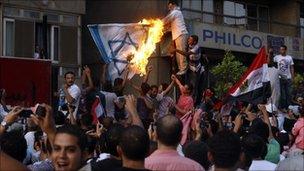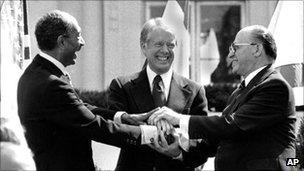Egypt-Israel 'cold peace' suffers a further chill
- Published

The current crisis has increased nervousness in Israel over the future direction of Egypt.
The departure of Israel's ambassador from Egypt after protesters tried to break into the embassy has plunged relations between the two countries to their lowest point for decades. The BBC's Yolande Knell explains the history of the neighbours' "cold peace".
The signing of the Camp David Accords between Egypt and Israel in 1978 is still seen as a high point in US diplomacy and peace brokering.
The secret negotiations between Egyptian President Anwar Sadat and Israel's Prime Minister Menachem Begin produced Israel's first peace treaty with an Arab nation the following year.
At the time, there was wide support from the vast majority of war-weary Egyptians and Israelis.
However, it has never led to more than a cold peace between their two countries.
On Egypt's side, public support for the treaty plummeted with Israel's military offensives in Lebanon and the Palestinian territories.
Yet after the assassination of Mr Sadat in 1981, in part because of his policy towards Israel, his successor President Hosni Mubarak took it upon himself to safeguard the peace treaty.
It made him a key strategic ally of the West and helped Egypt secure $1.3bn (£818m) a year in US military aid.
Since Mr Mubarak was ousted from power in a popular uprising in February, Israeli officials admit they have been worried about a possible increase in tensions.
Egypt's new military rulers and interim cabinet were quick to give assurances that the 1979 peace treaty would be upheld. Egyptian officials tried to show they could still play a valuable role as a go-between for Israel and the Palestinians.
However, last month relations began to deteriorate after five Egyptian border guards were killed in the Sinai during an Israeli military operation.
Israel said it was pursuing Palestinian militants from Gaza who it blamed for attacks that killed eight Israelis close to Eilat.
Large demonstrations outside the Israeli embassy in Cairo followed.
Egypt's cabinet threatened to withdraw the country's ambassador to Israel but quickly toned down its rhetoric after Israel promised an investigation into the Egyptian deaths and expressed its regret.
Preserving peace
In the past few weeks, there has been military co-operation between Egypt and Israel to allow an increase of Egyptian troops in the Sinai peninsula, where numbers were restricted under the terms of the peace treaty.

The US-brokered peace deal between Israel and Egypt has endured for 32 years, but does it have a future?
This has been in the interests of both countries with reports that al-Qaeda inspired militants have taken advantage of the security vacuum to use the region as a base.
The Egyptian authorities also tried to increase protection for the Israeli embassy in Cairo after last month's protests, erecting a new concrete wall outside.
Yet the violence that erupted on Friday night shows they cannot quell widespread anti-Israeli feelings.
Protesters stormed the embassy and broke into offices after an earlier demonstration over the slow pace of Egypt's political reforms in Tahrir Square.
The Israeli ambassador, Yitzhak Levanon, and more than 80 others were flown from Cairo to Israel overnight leaving just one diplomat behind.
With hundreds of people injured and several killed in a day of confrontations with police, the latest developments have been very damaging for Egypt's interim rulers.
They are also a powerful reminder of how the generals, already under pressure to hand over to civilian rule more quickly, are struggling to balance demands for a more assertive foreign policy with their own strategic interests.
After a crisis meeting between ministers and the military, Egyptian Information Minister Osama Heikel said "Egypt witnessed a harsh day that inflicted pain and worry on all Egyptians". He added that hated emergency laws would be used to protect the nation.
The televised address of the Israeli Prime Minister, Benjamin Netanyahu, then tried to reassure an anxious Israeli public.
He stated plainly that Israel was sticking to the peace treaty with Egypt and said discussions were under way so that the Israeli ambassador could return as soon as possible.
Icy future
Once again it was a US president that appears to have played a crucial role.
Although his relationship with Barack Obama has been damaged by the breakdown in Israeli-Palestinian peace talks, Mr Netanyahu said he called him by telephone to ask for his intervention.

It is hard for Egypt's interim rulers to counter widespread anti-Israeli sentiment.
Mr Netanyahu thanked the president and suggested all his influence had been brought to bear to secure help for Israeli security staff trapped in the embassy.
As bilateral relations between Egypt and Israel remain under immense strain, the State Department has said it was "deeply concerned" and that it would do all it can to prevent Egypt-Israel ties from fraying further.
It continues to refer to the 1979 peace treaty as "a cornerstone of regional stability".
In the short term, the stakes are too high - and the shared interests too deep - for Egypt to change its relationship with Israel dramatically.
What will now trouble Israeli officials more than ever are the long-term prospects of what Mr Netanyahu described as a "historic earthquake" in the Middle East.
Most prominent possible future Egyptian leaders - secular and Islamist - do not yet speak of breaking the 1979 peace treaty.
However they are making clear to an electorate that is hostile towards Israel that they will opt for a more distant relationship.
The cold peace between Israel and Egypt looks set to chill further.